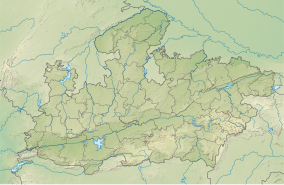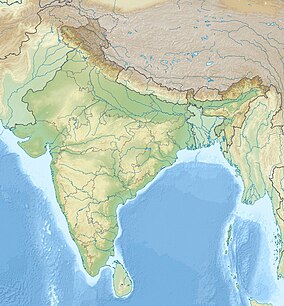Achanakmar Wildlife Sanctuary is a sanctuary in Mungeli district of Chhattisgarh and in the Anuppur and Dindori districts of Madhya Pradesh in India. It was established in 1975, under the provisions of the Indian Wildlife Protection Act of 1972, and declared as a Tiger Reserve under Project Tiger, in 2009.[1][2] It is a part of the Achanakmar-Amarkantak Biosphere Reserve.[3]
| Achanakmar Wildlife Sanctuary | |
|---|---|
IUCN category IV (habitat/species management area) | |
 Spotted deer in fields close to Achanakmar | |
| Coordinates | 22°33′N 81°44′E / 22.55°N 81.73°E |
| Area | 557.55 km2 (215.27 sq mi) |
| Designation | Wildlife Sanctuary, Tiger Reserve |
| Established | 1975 |
Geography and history
editLinked by the hilly Kanha-Achanakmar Corridor to the tiger reserve in Kanha, Madhya Pradesh, the sanctuary comprises 557.55 km2 (215.27 sq mi) of forest.[4] The park is part of Mungeli And Bilaspur Forest Division in northwest Chhattisgarh, around 50 km (31 mi) north of Mungeli. The nearest railway station is at Belgahna and nearest airport Bilaspur Airport(Bilasa Bai Kevat) at Chakarbhata (10 km from Bilaspur) which have regular flights from Delhi, Jabalpur and Prayagraj. Achanakmar can be reached from Pendra Road and Bilaspur railway stations. Achanakmar has a restaurant, a coffee house and many other facilities. The sanctuary is close to Amarkantak, the source of the Son River and Narmada River.[5]
Flora
editForest vegetation mainly comprises Sal, Saja, Bija, and Bamboo.[6]
Fauna
editThe sanctuary is home to the Bengal tiger, Indian leopard, gaur, chital, striped hyena, Indian jackal, sloth bear, Ussuri dhole, sambar, nilgai, four-horned antelope, chinkara, blackbuck, Indian muntjac and wild boar, four variety of monkeys among other species.
See also
editReferences
edit- ^ Nitinmahajan (15 May 2007). "3 C'garh habitats in Project Tiger". Indian Express. Retrieved 9 January 2022.
- ^ "Three more tiger habitats under Project Tiger". 4 May 2007. Retrieved 9 January 2022.
- ^ Tiple, Ashish (October 2010). Joshi, K.C.; Negi, M.S.; Tiple, Ashish (eds.). "Achanakmar-Amarkantak Biosphere Reserve". Biosphere Reserve Information Series (BRIS). 2. Jabalpur: Tropical Forest Research Institute. Retrieved 15 June 2013.
- ^ Kanha-Achanakmar, WWF India Archived September 24, 2008, at the Wayback Machine
- ^ Kanchi Kohli, Achanakmar village lies within the sanctuary, providing accommodation and food to tourists. At Shiv Tarai, there is Chhattisgarh forest department resort. It is booked by its website http://www.tigersofachanakmar.org. Another settlement with a tourist rest house stands at the Lormi Khudiya Dam, on the road to Khudiya, around 20.0 km (12.4 miles) from Lormi. At Shiv Tarai and Bari Ghat, there are road crossings where bison can often be seen. Achanakmar has been declared a part of Project tiger in 2009 and development of this country-side is ongoing."Forest Interlude: Eco-Tourism". In The Hindu, July 30, 2006
- ^ Achanakmar tiger reserve, Achanakmar. "Achanakmar Tiger Reserve". tigersofachanakmar.org. ATCF. Retrieved 15 December 2016.


